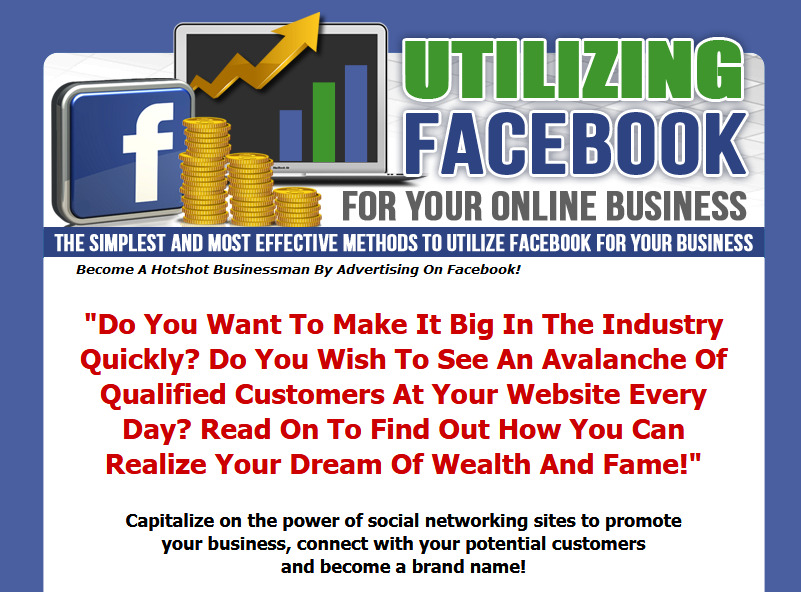Salespage Snapshot

Table of Contents
Introduction … 3
Maximizing Your Business with Facebook 3
What is Facebook? 3
Why Facebook is Important for Small Businesses …. 4
Increase Web Presence 5
Increase Brand Image … 6
Increase Customer Interaction …. 7
Lead Generation …. 8
Gain New Friends .. 9
Selling …. 10
Community Pages 11
Use Facebook as an Advantage …… 13
Create a Personal Profile … 13
Facebook News Feed . 14
Facebook Groups 16
Facebook Pages .. 16
Notes and Photos 17
Messages ….. 18
Facebook Marketplace 18
Paid Services ….. 19
Social Ads ….. 19
Market Research.. 20
Facebook Platform …… 21
Other Ways to Use Facebook . 22
Social Plug-ins ….. 22
Authentication …… 23
Facebook Negatives . 24
Data Leakage …… 24
Tone of Voice 25
Transition Time …. 26
Hackers . 27
Conclusion .. 27
Sample Content Preview
Increase Brand Image
This is a carry on from the previous point. The aim behind increasing web presence is to not only increase the brand awareness, but also increase brand image. While brand awareness or brand recall is easily achieved with advertising, increasing brand image is a little more difficult. Companies spend years developing a certain image for their brand, and any decision with regards to a new product is taken considering if it will fit the brand image or not.
Online this is not as difficult. Although the basics remain the same, it is much cheaper to develop a brand online than offline. For example, customer service online is usually restricted to email and responses to blog posts and questions in the forum. This is much easier to handle, and much cheaper in fact, than real time call centers where people answer your calls.
Of course, emails may not be able to fully replace human interaction, but it can reduce it by quite a big margin. In the same way advertising as well as promotion of a product is much cheaper online than it is in the real world.
Brand building is all about creating an image of the brand in the minds of the people, and one of the easiest ways to do this is to increase the interaction between the general population and the organization. While having a website is the bare minimum that an organization should do, there is not much interaction you can have with your customers through your website. Many sites have a “contact us” link and some even have a complaints page where you can log in and put in your complaints, but doing so in Facebook just increases the personal touch.
For example, while if you manufacture toasters and if a customer has a complaint with it, there is not much of a different between asking them to log into your website and post their complaint and asking them to do so on your Facebook page. The difference is that in Facebook they will be connected to you, so that as soon as a response is posted they will know about it instantly. While companies that do not have good customer service may not find this to be of much use, companies that spend on customer satisfaction will definitely find this useful. Imagine if you have a team that has a turn around time of less than four hours for every complaint, this is a good way to make your customers really feel that you care by giving them a resolution in under four hours. Even if you had as good a team, there is no point in it unless the customer realizes it, and Facebook ensures that your customers do.
Of course, you can integrate all the different facets into your customer service so that they receive and answer via email or even message to their phone that their issue has been resolved, but this calls for resources. In Facebook, everything is available. If a person connects to you on Facebook you do not have to worry about anything else other than resolving their issue, Facebook takes care of the rest. Not only this, but the customer’s own personal network will also be aware of your response, especially if he clicks on a “thumbs up” sign signifying that he was happy with your service. This may take time to build, but it gives you more returns than any other CRM tool.
Having a website is all good and well, but just as you have different clothing for different purposes, you need different tools for different purposes. The advantage of Facebook is that it has an already existing infrastructure as well as over 600 million users, while at the same time being cheap to use, so you do not have to spend any resources in developing a tool for yourself.
Increase Customer Interaction
Once again, this dovetails into the previous topic in that Facebook, as an existing networking tool gives you the option of using it to interact with your customers, at no cost to you. Simply having a corporate page on Facebook means that you will get people who are interested in you come and visit you. In addition, anyone who clicks on your fan button will have your logo on his or her profile. While this may not be a big plus with many SMB’s initially, over time a fan base can be created. Added to this is the fact that you are linked to these contacts’ contacts as well, which will help maximize your company’s visibility.
Because Facebook is a place where people network it is a great place for you to bring out any news regarding your company. For example, if you are bringing out a new product, mentioning this on Facebook is a good idea as it will help generate interest in the product.
You can use Facebook as a means of providing discounts to your customers if they purchase a product or service using their Facebook login, they will get a discount on the product. A simple example is the release of video games. When the smash hit Call of Duty 6 was released into the market, it was an almost instant hit getting so many downloads that their servers started to hang. Most of this was because of their shrewd marketing through the social media. Interest was generated in the game by targeting a few fans and sending them unique invitations to the next in series.
Studying how exactly they did all this mostly using Internet based tools is a lesson on what can be accomplished online, with the minimum of expense. Another company that sells software for different purposes uses its Facebook fan base as a pre-launch testing team to get feedback about the application.
How exactly you interact with your customers is up to you, just remember that Facebook offers you an existing network that you can exploit. Depending on how innovative you make this interaction, you can get huge dividends from little outlay in terms of expense and time.
Lead Generation
This is one use of Facebook that many people do not make use of. Facebook has a lot of information about its users, and this information is made available to others depending on the privacy level that the users specify. Whenever they use their Facebook ID to log into your site, (if you install this facility of course), Facebook will make available to you as much information as the user has in his or her public profile.
This means that when it comes to savvy people who are aware of how Facebook works, you may well only get general information like email addresses. Email addresses are useful tool considering that the email address on Facebook will mostly be genuine. When it comes to users who are either not knowledgeable enough about the different privacy settings in Facebook or are just not bothered enough, you can get much more information from Facebook.
Other Details- 1 Ebook (PDF), 29 Pages
- 12 Graphics (JPG, PNG)
- 1 Salespage (HTML)
- 1 Squeeze Page (HTML)
- Year Released/Circulated: 2017
- File Size: 2,653 KB
License Details:
[ Yes ] Can sell the eBook to your customers.
[ Yes ] Can give away eBook (PDF Format).
[ Yes ] Can be used as a bonus (PDF Format).
[ Yes ] Can include eBook in membership site (PDF Format).
[ Yes ] Can be combined with other offers or sold as a package.
[ No ] Can include within website flips.
[ No ] Cannot sell Resell Rights to customers.
[ No ] Cannot sell Private Label Rights to customers.














